1. “God Bless America”
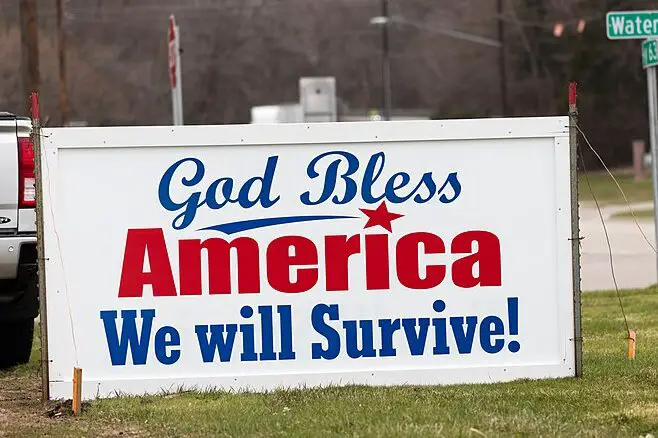
This one is practically baked into every political speech, regardless of the issue or party. But when you think about it, it’s not a policy, a position, or even a promise—it’s a spiritual mic drop. Politicians often end their statements with it to sound reverent and patriotic without actually saying anything of substance. It’s an emotional appeal, not an action plan.
While invoking divine support might sound powerful, it doesn’t tell us what the speaker believes or intends to do. You could tack it onto literally any stance—pro-war, anti-war, pro-tax, anti-tax—and it wouldn’t clarify a thing. It’s patriotism wallpaper: decorative, not structural. People may feel comforted by it, but it doesn’t move the political conversation forward.
2. “We’re the Greatest Country in the World”

This phrase is usually dropped like a mic after someone’s made a point—any point. But greatness isn’t a measurable policy outcome, and saying it doesn’t explain how or why it’s true. It’s often used to avoid acknowledging national problems by wrapping the conversation in a flag. Instead of addressing shortcomings, it implies that critique is unpatriotic.
Politicians use it as a rhetorical shield, especially when they’re about to justify maintaining the status quo. It’s also a handy way to distract from complex issues that require real answers. If you believe you’re already the best, why change anything? It’s more of a feel-good slogan than a meaningful statement.
3. “The American People Know What They Want”
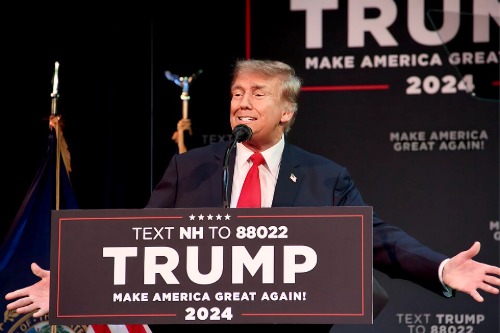
This sounds like a nod to democracy, but it usually means, “I’m going to do what I want and pretend it’s what you want.” Politicians invoke “the American people” as a kind of magical consensus that conveniently aligns with their viewpoint. In reality, the public is deeply divided on many issues, and boiling that down into one imagined voice is disingenuous. It’s a vague claim meant to skip over nuance.
You’ll often hear this phrase when someone is avoiding polls, data, or any actual evidence. It’s not about what the people want—it’s about what the speaker wants to be true. It’s also frustratingly non-specific: who exactly are “the American people” in this context? If a phrase erases disagreement, it probably isn’t that meaningful.
4. “Washington Is Broken”
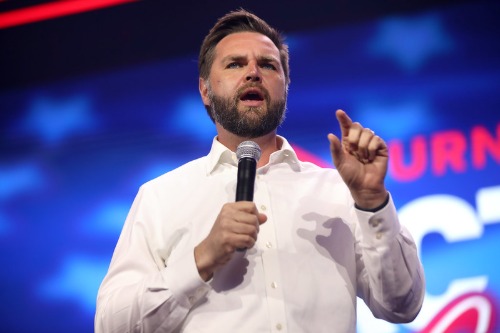
This is a bipartisan favorite, used to sound anti-establishment without taking any responsibility. Ironically, it’s often said by people who’ve been in Washington for decades. It’s a dramatic-sounding way to point fingers, but it doesn’t explain what’s broken or how they’d fix it. It’s complaint without commitment.
The phrase is also incredibly flexible—it can apply to gridlock, ethics, spending, or whatever issue is trending. Because it’s so vague, it dodges accountability while still sounding reformist. It allows politicians to present themselves as outsiders, even when they’re firmly entrenched insiders. Basically, it’s like saying, “Something’s wrong, but don’t ask me for specifics.”
5. “I Believe in America”

Of course you do—but what does that even mean in practice? This line is basically the political version of “thoughts and prayers”—emotionally satisfying but completely non-specific. It’s a way to signal values without defining them. Everyone believes in “America” in some way; the question is what they believe about it.
Usually, this phrase is thrown in to warm up a speech or soften a critique. But believing in a country isn’t a political platform. It’s an empty affirmation designed to sound noble and inspiring without offering any actual ideas. It’s patriotism-as-branding.
6. “Freedom Isn’t Free”

This sounds profound until you realize it’s almost always used to justify war, defense spending, or limiting civil liberties. The phrase implies sacrifice—but doesn’t specify who sacrifices, how, or whether it’s justified. It’s also a clever way to frame dissent as disrespectful. After all, if freedom has a price, who are you to question the bill?
It wraps complex geopolitical or ethical issues in a neat little bow. But slogans like this can actually suppress debate instead of encouraging it. It replaces policy discussion with emotional appeal. If something costs lives or dollars, we should talk about it—not just chant a phrase.
7. “Main Street, Not Wall Street”

This is supposed to signal support for the average American over big corporations, but it rarely comes with any actual policy details. Both parties love using this contrast, even when their donors and actions suggest otherwise. It’s a way to sound populist while maintaining business as usual. And it assumes that “Main Street” is a monolith, which it’s not.
The phrase also ignores the fact that small businesses and big banks are often interconnected. It’s an emotional shorthand that flattens economic complexity. When a politician says this, ask what they’re actually proposing—because usually, it’s just rhetorical window dressing. Without real legislation, it’s just a marketing tagline.
8. “We Need to Take Our Country Back”

This one has a charged history and a slippery meaning. It’s often used in times of political change to imply that something has been stolen—but never says by whom. It appeals to a nostalgic idea of America without defining what that past actually looked like. It can quietly dog-whistle to exclusionary ideologies under the guise of patriotism.
Because it’s vague, it lets people project their own grievances onto it—cultural, economic, racial, or political. That flexibility makes it powerful, but also potentially dangerous. It’s not really about unity or progress—it’s about asserting ownership over the national story. And unless someone clarifies what they’re taking back, it’s best treated with skepticism.
9. “I Work for You”
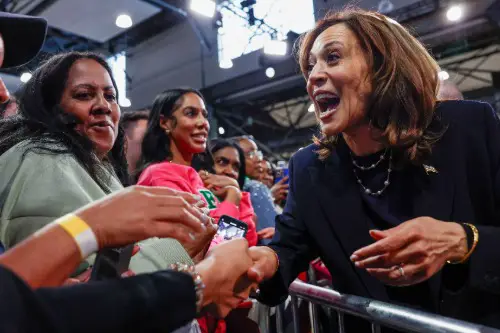
This one sounds humble and people-first, but it’s often just a slogan to avoid tough questions. If a politician really worked for you, they’d be transparent about their donors, votes, and priorities. Saying it doesn’t make it true—it’s just a verbal bow before doing what they planned to anyway. It’s a customer-service smile in sentence form.
You’ll hear this phrase a lot during campaigns, especially from incumbents. But when constituents show up with concerns, that “job” suddenly becomes less responsive. It’s also tricky because there’s no accountability mechanism tied to the statement. Unless there’s follow-through, this is just a talking point wrapped in flattery.
10. “This Is the Most Important Election of Our Lifetime”

It might be true—but they’ve said that every four years since at least the Cold War. This phrase is used so often that it’s basically lost all meaning. It’s designed to mobilize fear or urgency without explaining what actually makes this election different. And if every election is the most important, then none of them are.
It’s a great fundraising tool and turnout motivator, but not a meaningful political statement. You can say it about city council or the presidency—its flexibility is part of the problem. It replaces specificity with emotion. Before you believe the hype, look at the actual stakes.
11. “The Silent Majority”
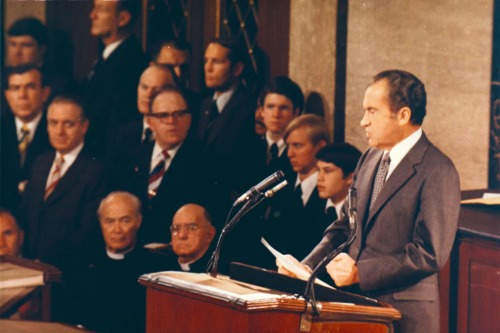
This term assumes that the real voice of the nation belongs to a group that isn’t publicly speaking. It’s been used since Nixon to suggest that those who don’t protest are actually the dominant moral force. The problem? It’s impossible to prove who this “majority” is or what they believe.
Politicians use it to frame opposition as loud but fringe. But claiming support from a group that, by definition, isn’t talking is a rhetorical loophole. It’s basically a way to speak on behalf of people who never asked you to. If a claim rests on invisible, silent support, it should raise questions—not settle debates.
12. “Hard-Working Americans”

This phrase is meant to flatter—but it’s incredibly vague and often exclusionary. Who counts as “hard-working”? Are we including gig workers, single parents, students, retirees? The phrase draws a moral line around labor without acknowledging economic systems or structural inequalities.
It’s used to justify policies by appealing to virtue instead of impact. Instead of explaining how a bill would help real people, politicians say it’s for “hard-working Americans”—a group no one can really define. It sounds nice but doesn’t mean much unless it’s backed by specifics. Otherwise, it’s just a feel-good placeholder.
13. “Bipartisan Solutions”
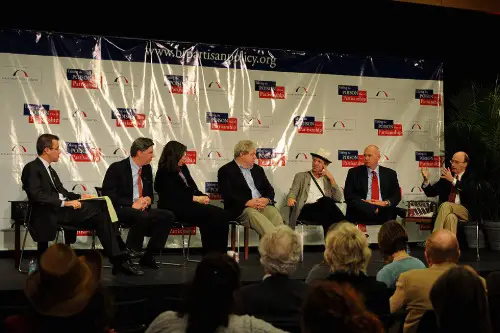
This one suggests common sense and cooperation—but it’s often used to promote watered-down compromises. Just because something is bipartisan doesn’t make it good or effective. Sometimes it means both sides agreed to kick the can down the road. It’s more about image than impact.
The phrase is also used to dodge strong moral or ideological stances. By saying “bipartisan,” politicians try to sound above the fray. But centrism isn’t always courage—it can be convenience. Without a clear plan or outcome, this is just political cover.
14. “Family Values”

This phrase sounds wholesome, but it’s often a euphemism for specific cultural or religious beliefs. It’s rarely defined in policy terms and can mean very different things to different people. Often, it’s used to oppose things like same-sex marriage, reproductive rights, or public education reform. It appeals to tradition without being clear about whose tradition it means.
When politicians say “family values,” ask which families—and whose values—they’re talking about. It’s a warm-and-fuzzy phrase that can carry a lot of political baggage. It doesn’t explain a policy, it signals a position. That makes it feel comforting, but dangerously imprecise.
15. “Support Our Troops”

This phrase is emotionally powerful but strategically vague. It’s often used to deflect criticism of military policy or spending. No one wants to seem anti-troop, so the phrase shuts down debate rather than opening it. But supporting troops could mean better VA care, fewer deployments, or bringing them home—none of which are spelled out.
It’s also used in campaigns and commercials to build credibility with voters without saying anything about defense policy. Like many phrases on this list, it’s a substitute for substance. Without specifics, “support” becomes a feel-good concept rather than a measurable goal. And that’s not fair to the troops or the taxpayers.
This post 15 Political Phrases That Sound Patriotic but Mean Basically Nothing was first published on American Charm.


